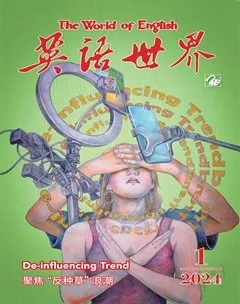Neighbour Rosicky (Excerpt VII)《邻居罗西基》(节选七)
薇拉·凯瑟/文 曹明伦/译析
After he was settled in his chair, stirring his coffee in a big cup, Mary took out of the oven a pan of kolache stuffed with apricots, examined them anxiously to see whether they had got too dry, put them beside his plate, and then sat down opposite him.
他在那把椅子上坐下,開始搅着一大杯咖啡,玛丽从烤炉里取出一盘杏仁小圆面包,一边担心地察看是否烤过了头,一边把面包放到他盘子旁边,然后在他对面坐了下来。
Rosicky asked her in Czech if she wasn’t going to have any coffee.
罗西基用捷克话问玛丽要不要喝点咖啡。
She replied in English, as being somehow the right language for transacting business: “Now what did Doctor Ed say, Anton? You tell me just what.”
玛丽用英语答话,不知何故,她觉得似乎这才是谈正事用的语言。“埃德医生怎么说?你快告诉我,安东。”
“He said I was to tell you some compliments, but I forgot ’em.” Rosicky’s eyes twinkled.
“他要我跟你问个好,可我把这事给忘了。”罗西基眨巴着眼睛说。
“About you, I mean. What did he say about your asthma?”
“我是问你的事。他怎么说你的哮喘?”
“He says I ain’t got no asthma.” Rosicky took one of the little rolls in his broad brown fingers. The thickened nail of his right thumb told the story of his past.
“他说我没有哮喘。”罗西基用他棕色的大手拿起一个面包卷。他右手拇指厚厚的指甲记载着他过去的经历。
“Well, what is the matter? And don’t try to put me off.”
“嗯,是怎么回事?你可别想敷衍我。”
“He don’t say nothing much, only I’m a little older, and my heart ain’t so good like it used to be.”
“他没多说别的,就说我上年岁了,心脏没以前那么好了。”
Mary started and brushed her hair back from her temples with both hands as if she were a little out of her mind. From the way she glared, she might have been in a rage with him.
玛丽猛然一惊,双手使劲从额前往后捋头发,好像她有点儿精神恍惚。从她瞪大的眼睛看,她可能是生他的气了。
“He says there’s something the matter with your heart? Doctor Ed says so?”
“他说你心脏有毛病?埃德医生是这么说的?”
“Now don’t yell at me like I was a hog in de garden, Mary. You know I always did like to hear a woman talk soft. He didn’t say anything de matter wid my heart, only it ain’t so young like it used to be, an’ he tell me not to pitch hay or run de corn-sheller.”
“别冲我嚷嚷,玛丽,我又不是闯进你菜园子的猪猡。你知道我爱听女人轻言细语地说话。他可没说我心脏有啥毛病,只说它不像过去那样有劲儿了。他还叫我别再叉草捆子,别再开玉米脱粒机了。”
Mary wanted to jump up, but she sat still. She admired the way he never under any circumstances raised his voice or spoke roughly. He was city-bred, and she was country-bred; she often said she wanted her boys to have their papa’s nice ways.
玛丽真想跳起来,不过她坐着没动。她欣赏罗西基说话的方式——在任何情况下都不用粗声恶语。他在城里长大,而她则是个乡下女人,所以她常说希望孩子们都像他们的父亲这般文雅。
“You never have no pain there, do you? It’s your breathing and your stomach that’s been wrong. I wouldn’t believe nobody but Doctor Ed about it. I guess I’ll go see him myself. Didn’t he give you no advice?”
“你没觉得过哪儿痛吧?以前你就是有点儿气喘,胃有点儿不舒服。这事除了埃德医生我谁也不信。我想我得亲自去问问他。他没叮嘱过你什么吗?”
“Chust to take it easy like, an’ stay round de house dis winter. I guess you got some carpenter work for me to do. I kin make some new shelves for you, and I want dis long time to build a closet in de boys’ room and make dem two little fellers keep dere clo’es hung up.”
“只说别干太累人的活,比如这个冬天就待在屋里。我想你该有些木工活儿要我干吧?我可以给你做几个新厨架,而且我一直都想在孩子们的房间里做个壁橱,好让那两个小家伙把衣服给挂起来。”
Rosicky drank his coffee from time to time, while he considered. His moustache was of the soft long variety and came down over his mouth like the teeth of a buggy-rake over a bundle of hay. Each time he put down his cup, he ran his blue handkerchief over his lips. When he took a drink of water, he managed very neatly with the back of his hand.
罗西基不时端起杯子喝口咖啡,心中盘算着这些事情。他嘴唇上方那溜胡子又长又软,像耙草机那排耙齿一样耷拉在嘴上。他每次放下杯子后都要用蓝手帕擦擦嘴唇。平时喝完水后他则会用手背认真地揩揩胡子。
【背景知识】《邻居罗西基》是美国女作家薇拉·凯瑟(1873—1947)于1930年发表的一篇重要短篇小说。小说通过回忆和追述的手法,讲述了波希米亚移民罗西基朴素而充实的一生,展现了拓荒者及其后代善良、朴素、勤劳、热爱生活、眷念土地的可贵品质。小说主题深刻,结构匀称,笔触细腻,文字优美,人物性格刻画清晰,翻译时应注意描摹。
【第1—3段】原文第1段状语从句中的was settled是被动语态,表示罗西基是在玛丽服侍下就座的,但这层意思已在上下文中不言而喻,所以翻译成“坐下”即可。英语被动语态的使用频率远远高于汉语,或者说汉语常常用主动语态表示被动意义,例如:书读完了、钱花光了、信寄出去了、论文写了一半。所以我们常把英语被动语态翻译成汉语的主动语态,例如把“The problem is being studied.”翻译成“问题正在研究”;把“The nominations have been unanimously adopted.”翻译成“提名已一致通过”;把“What language is spoken there?”翻译成“那里讲什么语言?”;等等。
【第4—8段】第4段中的’em = them;第6段中的says = said,I ain’t got no asthma = I don’t get any asthma;第8段中的He don’t say nothing much = He doesn’t say anything much。(“节选二”的译析曾提醒过:不规范英语中的双重否定仍然表示否定,甚至是加强否定)。
【第9—11段】第11段中的de = the;wid = with;an’ = and。
【第12—13段】第13段中的You never have no pain there = You never have any pain there;“Didn’t he give you no advice?”=“Didn’t he give you any advice?”(不规范英语中的双重否定仍然表示否定)。
【第14—15段】第14段中的Chust = Just;an’= and;de = the;dis = this;kin = can;dere clo’es = their clothes。
【小结】除再次提醒“不规范英语中的双重否定仍然表示否定”之外,本次译析谈到了被动语态的翻译问题。有语法学家强调“这种情况值得特别注意”。(参阅张道真《实用英语语法》第二次修订本,商务印书馆,1979,第160页)有高校翻译教科书用专章讨论这個问题,告诉学生“英语大量使用被动语态,而汉语则很少使用,……英语被动句译成汉语主动句,是最常见的方法”。(参阅郭著章《英汉互译实用教程》第四版,武汉大学出版社,2010,第124页和第127页)汉语当然也用被动语态,不少英语用被动语态的语句翻译成汉语时也需要用被动语态,但汉语的被动语态并非只用一个“被”字来表示,有学者就批评过“译者但看见‘-ed’就‘被’他一下”的译法。(参阅思果《翻译研究》,中国对外翻译出版公司,2001,第89页)其实汉语表示被动语态的用词(表达方式)比英语丰富得多,例如:可以把be beaten译成“挨打”,把be robbed译成“遭劫”,把be rescued译成“遇救”,把be employed译成“受雇”,把be elected译成“当选”,把be approved译成“获准”,把be damaged译成“给弄坏了”,把be instructed by him译成“经他指点”,把be bothered by affection译成“为情所困”,等等。

